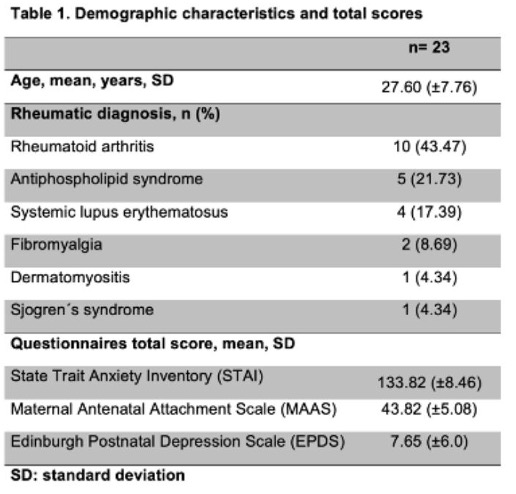Session Information
Date: Saturday, November 6, 2021
Title: Patient Outcomes, Preferences, & Attitudes Poster I: Impact (0225–0240)
Session Type: Poster Session A
Session Time: 8:30AM-10:30AM
Background/Purpose: Untreated perinatal anxiety symptomatology can be related to symptoms of anxiety and depression during the postpartum. The psychological bond created by the mother between mother and fetus helps to mitigate physical and emotional problems on this stage and in the postpartum. Prenatal maternal attachment acquires special importance because it has been shown that can be a predictor for healthier behavior during pregnancy and better birth outcomes. The aim of this study to correlate the scores between State Trait Anxiety Inventory (STAI), Maternal Antenatal Attachment Scale (MAAS) and Edinburgh Postnatal Depression Scale (EPDS).
Methods: A cross-sectional and descriptive study was conducted from January 2019 to May 2021 at the Pregnancy and Rheumatic Diseases Clinic from the University Hospital “Dr. Jose E. Gonzalez” in Monterrey, Mexico. Pregnant women with ARDs were invited to participate. The STAI is a questionnaire used in clinical settings to diagnose anxiety and to distinguish it from depressive syndromes. It has 20 items for assessing trait anxiety and 20 for state anxiety. All items are rated on a 4-point scale. Higher scores indicate greater anxiety. The MAAS is a 19-item self-report questionnaire which calculates a total attachment score and two subscale scores; one score estimating the quality of the affective attachment and the other that estimates the intensity of concern about the fetus. The EPDS is a set of 10 screening items that can indicate whether a parent has symptoms that are common in women with depression and anxiety during pregnancy and in the year following the birth of a child. The total score is calculated by adding the numbers selected for each of the 10 items, with a cut-off score of 10 points. The validated Spanish version of those instruments were applied during the third trimester. The statistical analysis was performed using the Pearson´s correlation test. Data included descriptive statistics. A p-value < 0.05 was statistically significant. The data were evaluated using the IBM SPSS v24 statistical package (IBM, Armonk, USA).
Results: A total of 23 pregnant women were recruited. A mean age of 27.6 years. The most common diagnosis was rheumatoid arthritis with 10(43.47), followed by antiphospholipid syndrome 5(21.73) and systemic lupus erythematosus 4(17.3), and other diagnosis (fibromyalgia (2), dermatomyositis (1) and Sjogren’s syndrome (1)). The STAI mean score was 133.82 points, the MAAS mean score was 43.82 points, and the EPDS mean score was 7.65 points. A negative moderate correlation was found between MAAS and EPDS (-.605, p=0.002) and also a positive moderate correlation between STAI and EPDS (0.442, p=0.034).
Conclusion: The maternal antenatal attachment had a moderate negative correlation with postnatal depression, meaning the less attachment equals a higher frequency of depressive symptoms. Moreover, a positive correlation between anxiety symptoms and depressive symptoms were found. Strategies to enhance the maternal bond must be addressed during all pregnancy stages. Postpartum women should receive psychological support and be screened for depression and anxiety, especially women with preexisting conditions such as ARDs and other chronic diseases.
To cite this abstract in AMA style:
Espinosa-Banuelos L, Rubio Torres D, Corral M, Skinner Taylor C, Perez-Barbosa L, Gutierrez Leal L, Lujano-Negrete A, Cardenas-de La Garza J, Galarza-Delgado D. Maternal Attachment, Anxiety and Depressive Symptoms in Pregnant Women with Rheumatic Diseases [abstract]. Arthritis Rheumatol. 2021; 73 (suppl 9). https://acrabstracts.org/abstract/maternal-attachment-anxiety-and-depressive-symptoms-in-pregnant-women-with-rheumatic-diseases/. Accessed .« Back to ACR Convergence 2021
ACR Meeting Abstracts - https://acrabstracts.org/abstract/maternal-attachment-anxiety-and-depressive-symptoms-in-pregnant-women-with-rheumatic-diseases/

